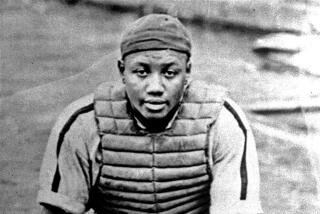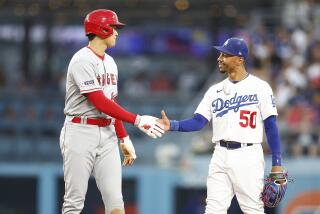McGee Could Still Win National League Batting Title
- Share via
The Athletics’ acquisition of Willie McGee late Wednesday night did more than bolster their championship chances. It also created several intriguing possibilities for him and his new team.
Although he’s left the National League, McGee conceivably could emerge as its batting champion. Because statistics do not officially transfer from one league to the other, he is “in the clubhouse” with a .335 average, which ranked second in the National League to Lenny Dykstra’s .340 average before Thursday night’s games. No player ever has won a batting title while competing in the other league. Rick Honeycutt, however, did lead the American League in earned run average in 1983 after pitching for the Dodgers the final six weeks.
Harry “The Hat” Walker led the National League in batting in 1947 with a .363 average, batting .200 in 10 games with the Cardinals before a May 3 trade, then batting .371 in 130 games with the Phillies. Dale Alexander, playing with the Red Sox and Tigers in 1932, led the American League in batting at .367. And Gus Zernial led the AL in home runs and RBI in 1951 while splitting the season between the White Sox and Athletics. But McGee has changed leagues, and therefore, he can accomplish an unprecedented feat. All he needs to do is watch Dykstra’s average fall.
Dykstra, batting .418 through June 3, batted .293 in 294 subsequent at-bats before Thursday night. More significant, perhaps, is that he had batted .308 in 182 at-bats since the All-Star break. If he were to continue to hit safely at that rate in the Phillies’ remaining 35 games and averaged 3.71 at-bats, as he had through Wednesday, he would finish with 200 hits in 601 at-bats, a .333 average and runner-up status.
And that doesn’t even take Dave Magadan into consideration. The Mets’ first baseman was batting .333 in 345 at-bats before Thursday night. If he won, he would be the Mets’ first batting champion.
Magadan, who entered the batting race as the No. 4 batter in the league Aug. 8 when his total plate appearances finally qualified, considers McGee and Dykstra quite formidable competition, and not only because of their averages.
“Lenny and McGee play on (artificial) turf, and (Tony) Gwynn might as well (because) the infield is so hard in San Diego,” he said. “And they can get some leg hits. I’m not going to get many of those.
“I think I can stay close as long as I don’t get unlucky,” Magadan said. “I’ve already passed that period of being mentally tired. So if I stay away from bad luck, I’m OK. With me, the hits have to be perfect because I’m not going to beat out a ball in the hole. Some of the worst slumps -- if you want to call them that -- I’ve ever had are the times when I’ve hit the ball hard.”
If McGee wins the batting championship, it will be his second. He also won in 1985, the season he batted a career-high .353 and won the National League Most Valuable Player Award.
No matter what happens in the race, McGee has assured himself of avoiding two unwanted distinctions.
Until now, McGee and Norm Cash, the late Tigers slugger, were the only players in major-league history to bat .350 or higher in a season of at least 450 at-bats without hitting higher than .300 in any other “full” season. Now Cash stands alone.
Secondly, McGee’s error total for the National League will remain at 16. He almost certainly will lead National League outfielders in errors -- Lonnie Smith of the Braves is second with 11 -- but McGee’s total is far from the 20 “Indian Bob” Johnson committed with the Athletics in 1935. Whatever errors McGee commits with the A’s won’t be added to the 16.
But think of the possibilities: McGee not only could be the National League batting champion, playing for the American League champions in the World Series, but he and Rickey Henderson could emerge as batting champions and teammates. That would be a more immediate marriage than what developed last winter when free-agent Mark Davis, the 1989 National League Cy Young Award winner, signed with the Royals and joined his American League counterpart, Bret Saberhagen.
Looked good at the time, but look at what has happened to the Royals since.
More to Read
Are you a true-blue fan?
Get our Dodgers Dugout newsletter for insights, news and much more.
You may occasionally receive promotional content from the Los Angeles Times.









